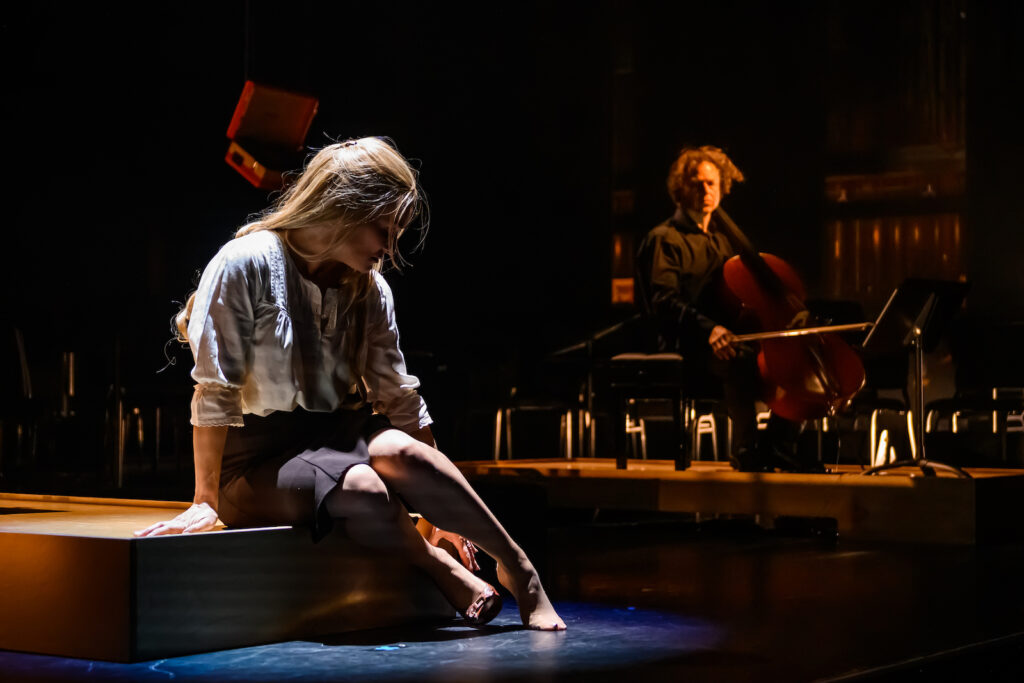Precisely five years plus a day, Jacqueline, a unique, startlingly inventive 90-minute chamber opera spotlighting the meteoric rise and heartbreaking descent of acclaimed world cellist Jacqueline du Pré, returned to its selfsame place of origin late last week with a bright, shining remount at the National Ballet School’s Betty Oliphant Theatre, as vibrant and shimmering as ever, probing deep into the intensity of experience and emotion that was du Pré’s life.
Stunningly composed by Montreal-based Luna Pearl Woolf, glowing poetic libretto by Canadian Brooklynite Royce Vavrek, the dazzling, quadriptych-like portrait of du Pré, shadowed by tragedy, summoned a kaleidoscope of fresh reaction, a casting of what feels like new light on a work long-cherished in memory, more impression, perhaps, than stark illumination, but no less intense.
Woolf’s music, a shrewdly shifting complex of chromaticism and discordance punctuated by laser-sharp bursts of altered rhythm and tonality, provided, as expected, a sweeping opportunity for prodigiously flexible lyric soprano, Marnie Breckenridge, to endow du Pré — Jacqueline’s sole vocal role — with immense strength of dramatic purpose.
Du Pré’s frantic telephone call to her mother, a poignant pivot point in Act III — Movement III in Jacqueline parlance — proved particularly potent, a fugue-like, multi-tracked knot of fear and apprehension, Breckenridge in animated 3-part electronically enhanced conversation.
Mother. I am so dreadfully lonely in this house.
Trio of one aside, in the final analysis, when everything is said and sung, however, this remarkable, theatrically towering, starkly minimalist musical romance — cellist Matt Haimovitz passionately personifying du Pré’s almost mythical instrument with lusty virtuosity — is and was as much, if not more, about words and language, both spoken and played, than carefully calculated score. Even when silence settles on stage — rarely — communication between player and singer reigns supreme, shared understandings nestled bar after bar, half-hidden between multitudes of sounded notes.
Exposition is everything in Jacqueline. Everywhere. Always.
Breckenridge’s du Pré, her body paralyzed by MS, the devastating autoimmune muscular skeletal disease that savagely ended her career at twenty-eight, sings at the close of Movement IV from a hard, straight-back wooden chair.
I can close my eyes and see every colour.
Of her early childhood in a happy Oxford household and her first cello, a full-sized professional instrument.
See, mommy! It’s not too big! I can put my arms around it!
Of her country rambles with older sister, Hilary, the two running through fields of wildflowers, girlish high spirits flying. A time of freedom glimpsed time and time again in Jacqueline’s mind’s eye.
Primrose, cowslip, wild garlic.
Of her youthful sexual adventures with future husband, pianist/conductor Daniel Barenboim. A tangle of long limbs and rebellious hair. A sudden downpour.
Feel me. Wet with rain. Samson and her lover.
Of her irreverence and insatiable appetite for risqué jokes and crude wordplay.
I am the hussy straddling the Strad! Wild, ferocious, all romance!
Joyfulness and innocence. Sensuality and humour. Vavrek’s terse, excruciatingly eloquent verses somehow spoke with an air of heightened humanity when plotted against a less than perfect recollection of the 2020 production; foibles, vulnerability, glorious expressions of simple being, all urgently thrust into the foreground of our consciousness, darker impulses crowding in.
My hands grow weak. My words trip up. My memory is all full of holes.
Who do you talk to, Daniel? Who do you make love to when I’m not there?
I fell on the heath, Hilary. Don’t tell.
Everything felt more intense here, the highs and the lows, the blessings and the curses. But, in reality, the two universes populated by the Jacqueline of past remembrance and this turbulent, tumbled Jacqueline rejoined are less products of artistic realignment — director Michael Hidetoshi Mori’s vision of a world thrown into unmanageable chaos remains essentially unaltered — more a consequence of the changes we ourselves have undergone, surely.
Self-confessed or not, we carry forward from our time of first encounter with Jacqueline to today, all the suffering, all the death, all the loss of purpose experienced during the pandemic. Bitter facts of life. It is not the artistic parameters of the work that have shifted. It is we who have grown more sentient. Life feels more precious. Fear seems to strike deeper, happiness more exalted.
Elgar’s Cello Concerto in E Minor, a piece made virtually wholly du Pré’s during her lifetime, played by Haimovitz with great sensitivity and candor at closing, speaks to us here and now across the void of fractured time that was lockdown.
A cry from the soul. A prayer. A plea.
I am Jacqueline du Pré. Fix me.


